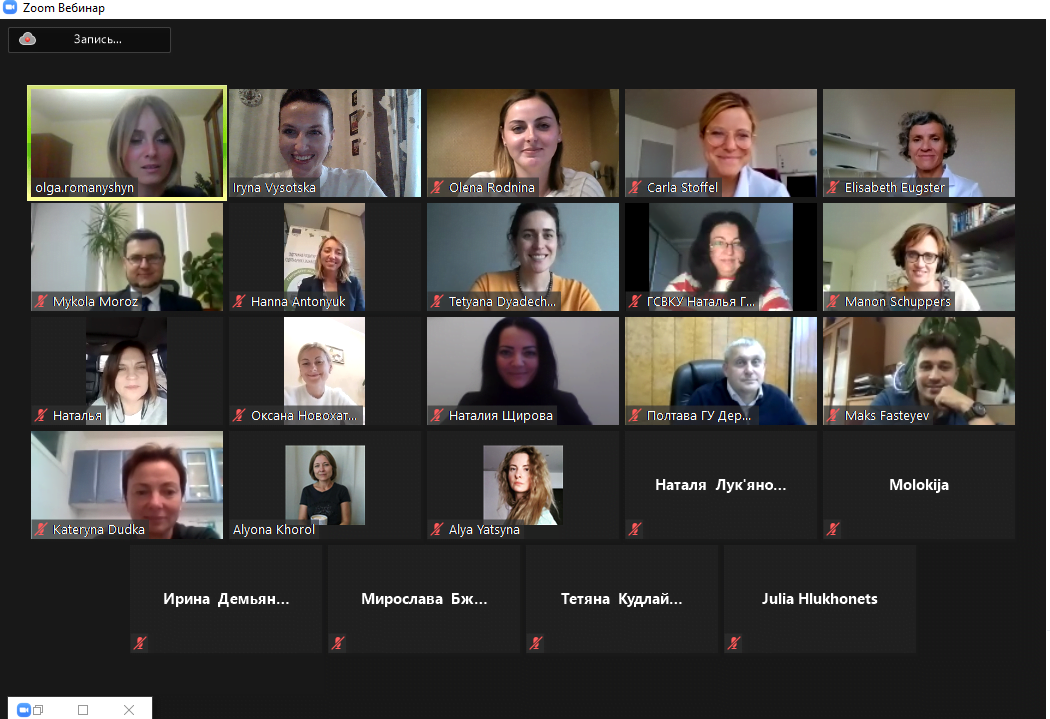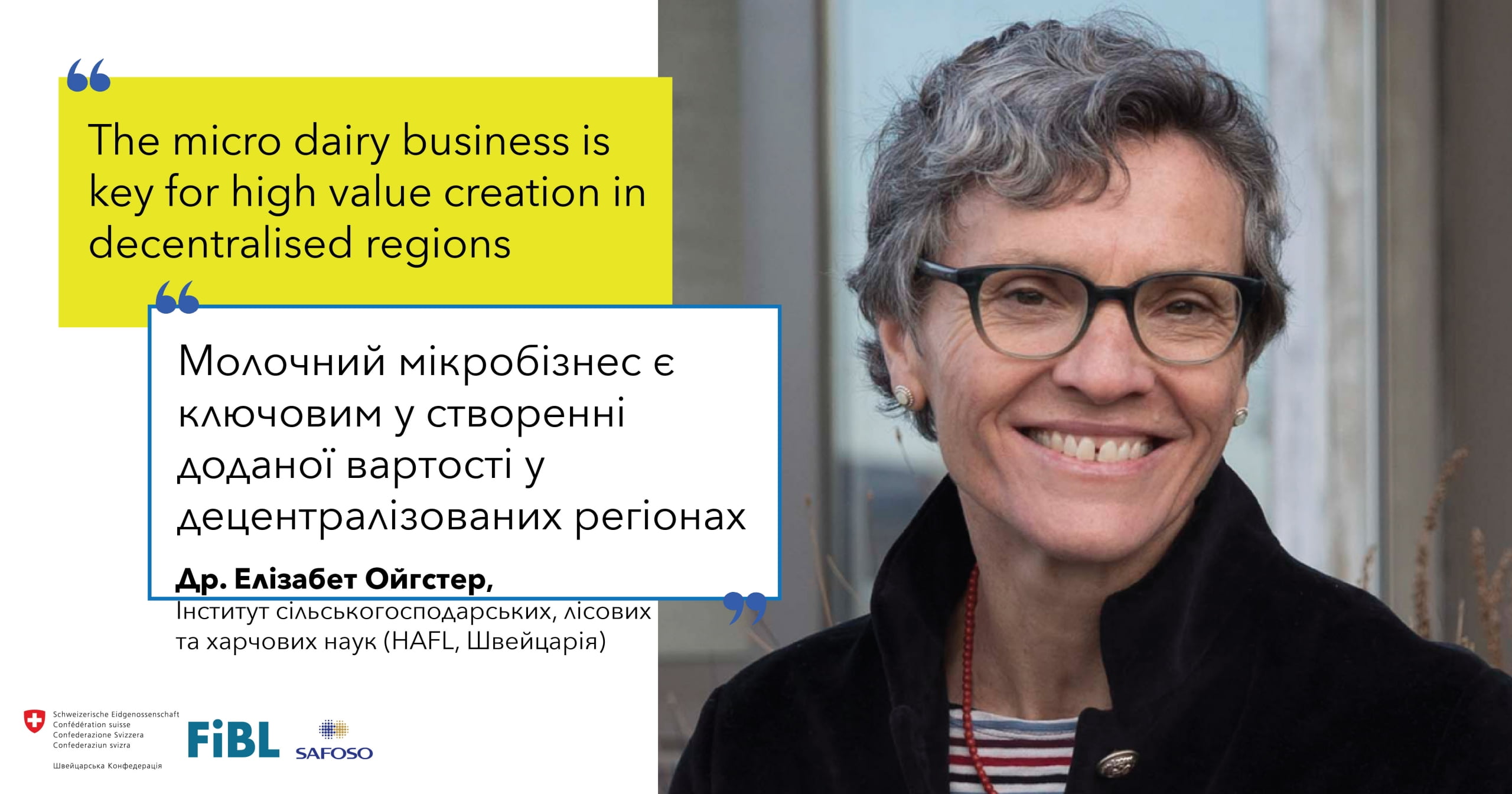On 30 September 2020, the first online webinar on flexible approaches for micro- and small dairy businesses was held. The event was organized with the cooperation of the Ministry for Development of Economy, Trade and Agriculture of Ukraine (MDETA), State Service of Ukraine for Food Safety and Consumer Protection (SSUFSCP), and the Swiss-Ukrainian Program “Higher Value Added Trade from the Organic and Dairy Sector in Ukraine” implemented by the Research Institute of Organic Agriculture (FiBL, Switzerland) in partnership with SAFOSO AG (Switzerland).
Over 80 participants from 19 oblasts got registered and were able to join the webinar: 32 representatives of micro- and small businesses, 8 experts of the SSUFSCP main and regional directorates in oblasts, 10 representatives of the MDETA and SSUFSCP, 21 representatives of milk producer and processor associations, NGOs, and international technical assistance projects.
The objective of the webinar was to start the discussion among all the stakeholders with regard to the issues related to the implementation of simplified and flexible approaches to micro- and small food business operators in the dairy sector.
Mykola Moroz, General Director of the Food Safety Directorate of the Ministry for Development of Economy, Trade and Agriculture of Ukraine, gave a welcome address:
We are very much aware that, probably, micro or small producers cannot always comply with all the legislative requirements. But, on the other hand, we understand that support to small producers is important, because, in the first place, there is consumer demand for products from micro- and small producers. Secondly, micro- and small producers mean food security. This is about self-employed people who, among other things, create jobs. And, thirdly, this is rural development where the role of small producers can hardly be overestimated. We are working on a so-called ‘package law’ which, in a targeted way, amends a number of laws to improve our system. Currently, we are elaborating on special hygienic requirements which also provide for flexibilities or simplified approaches to small producers.
We hold consultations and remain open to recommendations and requests that we receive.
We cooperate with international technical assistance projects in terms of clarifications and infographics. The producers can visit our website for answers to their questions related to subsidies and state support. I urge the producers to use such resources more often. I also encourage small producers to join associations and, through associations, to develop own guidelines related to general hygienic requirements as well as other requirements defined by the law with regard to food safety and some parameters of food quality. Now, according to the law, we have an opportunity to approve such guidelines, so we are looking forward to your proposals and ready to approve them.
Olga Shevchenko, Acting Head of the State Service of Ukraine for Food Safety and Consumer Protection, highlighted in her welcome address:
I would like to thank the organizers for having cleverly drawn attention to the relevancy of work with small producers. In my opinion, it is crucial that there is interest and opportunity to hear their problems and needs. Of course, the legislation is binding for everyone, because it aims to ensure food security, safe consumption, and consumer protection. However, everyone has the right to implement their initiatives within the law, so I always support local producers, because I am curious to consume local products and I am proud of what we can do in Ukraine. For me, as a representative of the public authority, it is important that all the products comply with norms, quality, and safety requirements, in the first place. There is a fine line here, but the government should expressly help producers in finding proper approaches and take into account their interests to develop our uniqueness. So, if you want to be heard, tell about your problems. It sometimes seems that you can hardly influence anything, but it is important to speak in one voice, have a constructive and real understanding of necessary changes of approaches.
Igor Kravchenko, Local Program Manager, the Swiss-Ukrainian Project “Higher Value Added Trade from the Organic and Dairy Sector in Ukraine, noted:
We pay special attention to capacity development in the implementation of our Program. This event is a vivid example of this approach, as capacity development should be implemented on three levels: national, organizational, and personal. The main idea of capacity development is that the initiative comes from our partners and we support them. As a result, our partners are the ‘owners’ of our joint work, which means that all the achievements within our Program, i.e. knowledge, skills, and information, will stay and be further used after the Program is over.
Kateryna Onul, Food Safety Global Platform, International Finance Corporation (IFC), familiarized the participants with the flexible approaches in applying food hygiene requirements in food production based on the EU experience.
Dr. Elisabeth Eugster, Head of Food Technology and Management Department at the School of Agricultural, Forest and Food Sciences (HAFL, Switzerland), shared experience in ensuring the safety of food from micro- and small producers in Switzerland and highlighted that food legislation is binding for everyone, regardless of the producer’s size. Private sector associations play an important role, they elaborate the detailed guidelines for their members which are recognized by competent authorities and stakeholders. These guidelines are so user-friendly that they are compared to cooking recipes. They are especially valuable for microbusiness and seasonal cheese production in the Swiss highlands.
Hanna Antoniuk, National GI Expect (cheese) on Food Products in Western Ukraine, the EU Project “Support to the Development of a Geographical Indications System in Ukraine”, highlighted the importance of flexibility in the policy of some regions that have specific geographical limitations and in supporting the use of traditional methods.
Tetiana Diadechko, the owner of Kozachka Dairy, who has been producing craft cheese and dairy products for over 7 years, shared the microbusiness’ expectations from the new policy.
Nataliya Iakymenko, Deputy Chairperson of Sheep and Goat Production of Ukraine Public Union, told about the main challenges faced by the microbusiness and how they could be overcome.
Vitaliy Bashynskyi, Head of Public Council under the SSUFSCP, provided the strategic vision of normative recognition of a ‘craft producer’ in the field of food production and placing on the market.
The event participants were able to ask the speakers their questions in the online chat and receive the answers during the Q&A sessions. This format allowed uniting representatives of state authorities and microbusiness to better understand each other’s needs and problems and how to act further.
This event was organized with support of Switzerland in the frame of the Swiss-Ukrainian Project “Higher Value Added Trade from the Organic and Dairy Sector in Ukraine” implemented by the Research Institute of Organic Agriculture (FiBL, Switzerland) in partnership with SAFOSO AG (Switzerland).

